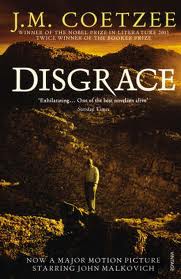Coetzee, John. M. (1999/2008). Disgrace. New York: Penguin, 220 pages.
Written shortly after the end of apartheid in South Africa, the story tells of a professor who has sex with a student, and when the affair becomes public, he is subject to a faculty disciplinary hearing. This inquiry by his peers and superiors crackles with subterranean emotion. The professor openly admits his transgression, but that is not sufficient for the committee, which insists on… what? Heartfelt apology? Contrition? Groveling? This opening episode is wonderful in its own right but can also be read as an allegory for the emotional complexity of the South African Truth and Reconciliation Commission.
The professor retreats in disgrace to his daughter’s rural farm where he helps her care for stray dogs. In the country, the tyranny of anarchy replaces the tyranny of authoritarianism. A terrible crime occurs and in its complex cultural, political, and ethical aftermath, we wonder if the daughter is disgraced or not, if the white race is disgraced, if the black race is disgraced, if South Africa is disgraced. What is disgrace?
I should mention that the terrible crime is a gang rape of a white woman by black men. That’s a bit of a spoiler, I know, but I believe some readers would like to be prepared for something like that. The actual violation occurs off-page, but it is still a horrific thing to contemplate. As was apartheid.
Narration is first-person, present tense, told by the professor. There are no postmodern self-referential tricks, no time compressions, flashbacks, anti-realist elements. It is a straight-ahead, down-to-earth story told in chronological order. The writing is spare yet deeply expressive. Every sentence is a crafted work of art. Characters are only sketched, yet seem fully rounded because of the skill with which they are described. Thematically, the story can be read as a political allegory, or enjoyed simply as a compelling human drama.
Disgrace won the 1999 Booker Prize. Coetzee won the Nobel prize for literature in 2003. (Coetzee is pronounced “Cut-ZEE-ya”)

